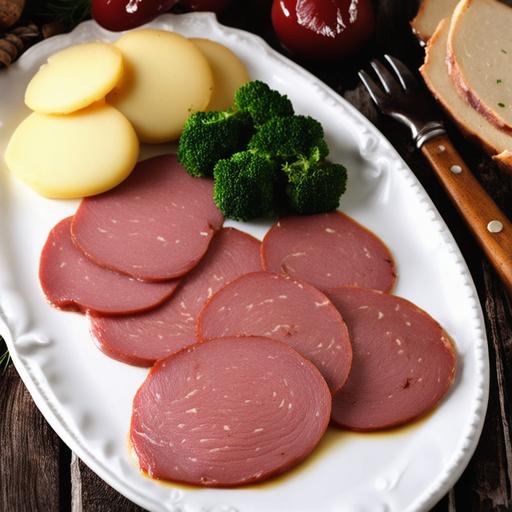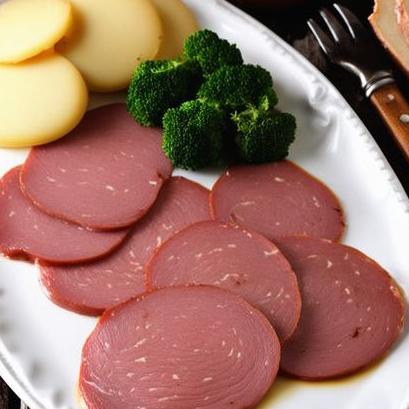
The Perfect Deer Bologna Oven Recipe: A Comprehensive Guide To A Mouthwatering Delight
Deer bologna is a delectable delicacy enjoyed by many hunting enthusiasts and food aficionados alike. Its rich flavor and unique texture make it a perfect addition to sandwiches, charcuterie boards, and even eaten on its own. In this comprehensive guide, we will delve into the culinary details, food science, selection process, cleaning, preparation, cooking tips, variations, doneness checks, and share an incredible deer bologna oven recipe that will have your taste buds dancing with joy.
Understanding the Food Science Behind Deer Bologna
Before diving into the cooking process, it’s essential to understand the food science involved. Deer bologna is typically made from ground venison, pork fat, and a blend of savory spices. The science lies in achieving the perfect balance of fat, lean meat, and seasonings, resulting in a juicy and flavorful creation.
The ratio of fat to meat is critical in ensuring a succulent bologna. Too little fat can lead to dryness, while too much can make it greasy. The recommended ratio is typically 20-30% pork fat to 70-80% venison. This proportion allows for a moist, yet well-textured bologna that pleases the palate.
Selecting the Perfect Venison and Pork Fat
To create a scrumptious deer bologna, selecting high-quality venison and pork fat is crucial. When choosing venison, look for meat that is fresh, with a vibrant red color and minimal connective tissue. Additionally, ensure that the venison has been properly handled and stored to maintain its freshness.
When selecting pork fat, opt for cuts like back fat or belly fat. These cuts have an ideal balance of fat and meat, providing the necessary richness for a successful bologna. Ensure that the pork fat is free from any off-putting odors or discoloration, as this can affect the overall taste.
Cleaning and Preparing the Venison

Before embarking on the bologna-making journey, it is essential to thoroughly clean and prepare the venison. Start by rinsing the meat under cold water to remove any debris or dirt. Pat it dry with paper towels.
Next, trim any excess fat or silver skin from the venison. Removing these unwanted elements helps ensure a smoother texture in the final product. Cut the meat into smaller, manageable chunks that are easier to grind.
Grinding the Venison and Pork Fat
Grinding the venison and pork fat is a crucial step in the bologna-making process. It allows for a consistent texture and thoroughly incorporates the fat into the mixture.
Use a meat grinder fitted with a coarse grinding plate to grind the venison and pork fat separately. Ensure the grinder and all equipment are clean and sanitized to maintain hygiene.
Once ground, combine the venison and pork fat in a large mixing bowl. Mix them together gently, taking care not to overwork the mixture, as this can result in a dense bologna. Incorporate the fat evenly throughout the venison until it forms a well-blended mixture.
Adding Flavor with Savory Spices
Spices are the heart and soul of any bologna recipe, adding depth of flavor and enhancing the taste experience. There are numerous variations when it comes to spices; however, most traditional deer bologna recipes include a combination of the following:
-
Garlic powder
-
Onion powder
-
Mustard seeds
-
Black pepper
-
Paprika
-
Salt
-
Liquid smoke (optional)
-
Red pepper flakes (for a spicy kick!)
Feel free to experiment with different spice combinations, adjusting the quantities according to personal preference. The spice blend should complement the flavors of the venison without overpowering it.
Tips and Tricks for a Perfect Bologna
Cooking deer bologna to perfection requires some valuable tips and tricks. Here are some secrets to ensure an outstanding result:
1. Mixing Techniques
When blending the spices into the venison mixture, it’s important to fold them in gently. Overmixing can disrupt the texture, resulting in a chewy, less tender bologna.
2. Resting Period
After mixing the spices, allow the mixture to rest in the refrigerator for at least 24 hours. This resting period allows the flavors to meld together, resulting in a more harmonious taste.
3. Casing Selection
Choose natural or synthetic casings for your bologna. Natural casings, like collagen or beef, add a traditional touch and provide a delightful snap when bitten into. Synthetic casings, on the other hand, are convenient and readily available.
4. Smoking Options
Smoking the bologna adds a delightful smoky flavor to the already delicious mix. You can choose to smoke it in a smoker, using hardwood chips of your choice, or opt for liquid smoke to infuse that characteristic flavor.
5. Temperature Control
Maintaining a constant oven temperature is crucial throughout the cooking process. Fluctuations can lead to uneven cooking and potentially dry out the bologna. Use an accurate oven thermometer for optimal control.
Recipe: Oven-Baked Deer Bologna

Now that we’ve covered all the essential details, it’s time to dive into the mouthwatering recipe for oven-baked deer bologna. This recipe is designed to yield approximately five pounds of delicious bologna.
Ingredients:
-
4 pounds ground venison
-
1 pound pork fat
-
2 tablespoons garlic powder
-
2 tablespoons onion powder
-
1 tablespoon mustard seeds
-
2 tablespoons black pepper
-
2 tablespoons paprika
-
3 tablespoons salt
-
1 tablespoon liquid smoke (optional)
-
1 tablespoon red pepper flakes (optional)
Instructions:
Preparing the Mixture:
-
In a large mixing bowl, combine the ground venison and pork fat. Gently mix them together until well blended.
-
In a separate small bowl, whisk together the garlic powder, onion powder, mustard seeds, black pepper, paprika, salt, liquid smoke (if using), and red pepper flakes (if desired).
-
Gradually add the spice mixture to the venison mixture, folding it in gently until evenly dispersed. Take care not to overmix.
-
Cover the bowl with plastic wrap and refrigerate for at least 24 hours to allow the flavors to meld.
Shaping and Cooking the Bologna:
-
Preheat the oven to 325°F (163°C).
-
Prepare the casings according to the package instructions. If using natural casings, soak them in warm water for approximately 30 minutes to soften.
-
Stuff the venison mixture into the casings, ensuring they are filled firmly but not overly tight. Leave space for expansion during cooking.
-
Using butcher’s twine, tie off the casings, leaving some room between each sausage link.
-
Place the bologna on a wire rack set inside a baking sheet to allow for even cooking and to catch any drippings.
-
Bake the bologna in the preheated oven for approximately 2 to 3 hours, or until the internal temperature reaches 160°F (71°C).
-
After cooking, remove the bologna from the oven and let it rest for 15-20 minutes before unwrapping or slicing.
Important Doneness Checks
Determining the doneness of the deer bologna is critical to ensure food safety and a fantastic eating experience. Here are a few methods to check if the bologna is cooked to perfection:
-
Internal Temperature: Use a meat thermometer to verify that the internal temperature has reached 160°F (71°C). Insert the thermometer into the center of the bologna to obtain an accurate reading.
-
Appearance and Color: The bologna should have a uniform pinkish-brown color throughout, with no visible raw or undercooked areas.
-
Texture: Slice a small piece of the bologna and evaluate its texture. It should be firm, yet tender, with no indication of rawness or excessive moisture.
Overcooking and Undercooking – the Risks Involved
Overcooking or undercooking deer bologna can have a significant impact on the end result. Overcooked bologna can become dry and lose its delicate texture, while undercooked bologna can risk foodborne illnesses due to bacterial contamination.
To avoid these risks, it is crucial to follow the recommended cooking times and internal temperature guidelines provided in the recipe. Regularly check the bologna’s temperature during cooking to ensure it is neither undercooked nor overcooked.
Delicious Variations to Explore
Exploring variations can add exciting twists to your deer bologna. Here are a few ideas to inspire your culinary creativity:
1. Jalapeno and Cheddar Bologna
Add a spicy kick by including finely diced jalapenos and cubes of sharp cheddar cheese to the mixture. The melted cheese and heat from the jalapenos create a flavor explosion in every bite.
2. Maple-Glazed Bologna
For a touch of sweetness, glaze the bologna with a maple syrup and Dijon mustard mixture before baking. The combination of savory and sweet flavors will be a delightful surprise.
3. Italian Herb Bologna
Infuse a taste of Italy by incorporating dried Italian herbs such as oregano, thyme, and basil into the spice blend. This variation pairs exceptionally well with sandwiches and antipasto platters.
Feel free to experiment with different flavor profiles to suit your taste preferences. The possibilities are endless!
Conclusion
Congratulations! You’ve embarked on an exciting venture to create your own mouthwatering deer bologna. Our comprehensive guide has armed you with the knowledge necessary to master this culinary delight. We’ve explored the food science, selection, cleaning, preparation, cooking tips, variations, doneness checks, and shared our incredibly delicious oven-baked deer bologna recipe. So gather your ingredients, roll up your sleeves, and savor the joy of crafting your very own delectable bologna that will impress family and friends alike. Happy cooking!
Sources
FAQS On Deer Bologna Oven Recipe
What Type Of Deer Meat Is Best For Making Bologna In The Oven?
The best deer meat for making bologna in the oven is the hindquarters (also known as the ham) or the shoulder. These cuts are tougher and contain more connective tissue, which makes them perfect for slow cooking.
How Long Does It Take To Cook Deer Bologna In The Oven?
It usually takes around 4-6 hours to cook deer bologna in the oven. The exact cooking time will depend on the size and thickness of the bologna, as well as your oven temperature.
Do I Need Any Special Equipment To Make Deer Bologna In The Oven?
You will need a meat grinder, a sausage stuffer, and an oven-safe pan or dish to make deer bologna in the oven. You may also need a food processor or blender to mix the spices and other ingredients.
What Spices And Seasonings Are Typically Used In Deer Bologna?
The most common spices used in deer bologna include salt, black pepper, garlic powder, onion powder, paprika, and mustard seed. Some recipes may also include cayenne pepper, red pepper flakes, or other herbs and spices.
How Do I Know When My Deer Bologna Is Fully Cooked?
You should use a meat thermometer to check the internal temperature of the deer bologna. It should reach an internal temperature of 160°F for safe consumption. You can also do a color and texture check – the bologna should be firm to touch and have a nice browned crust.


